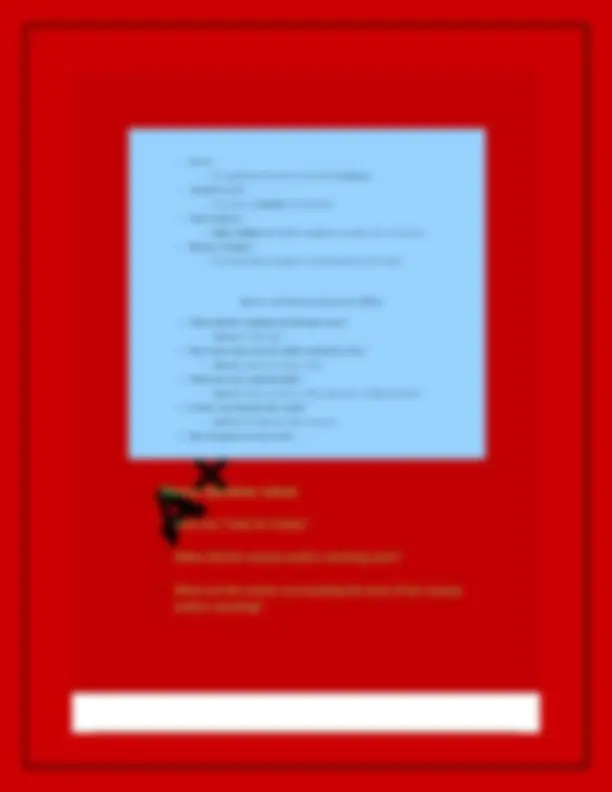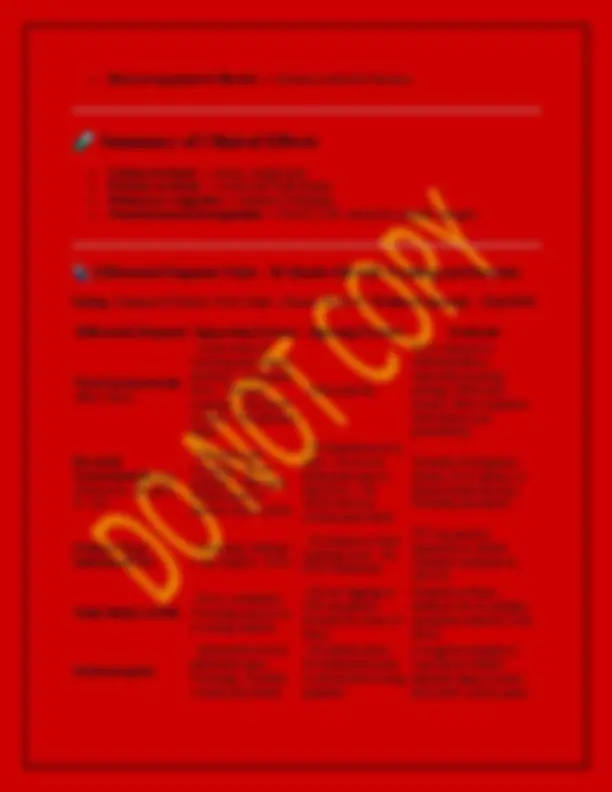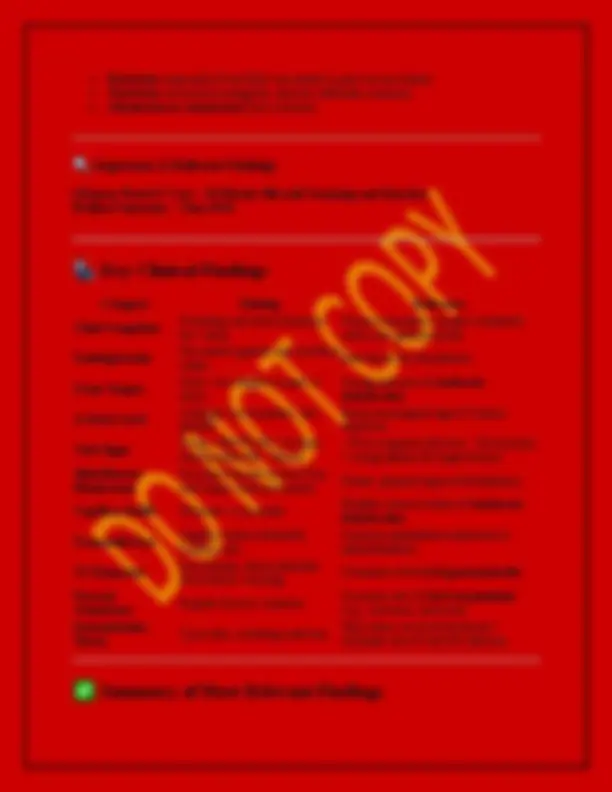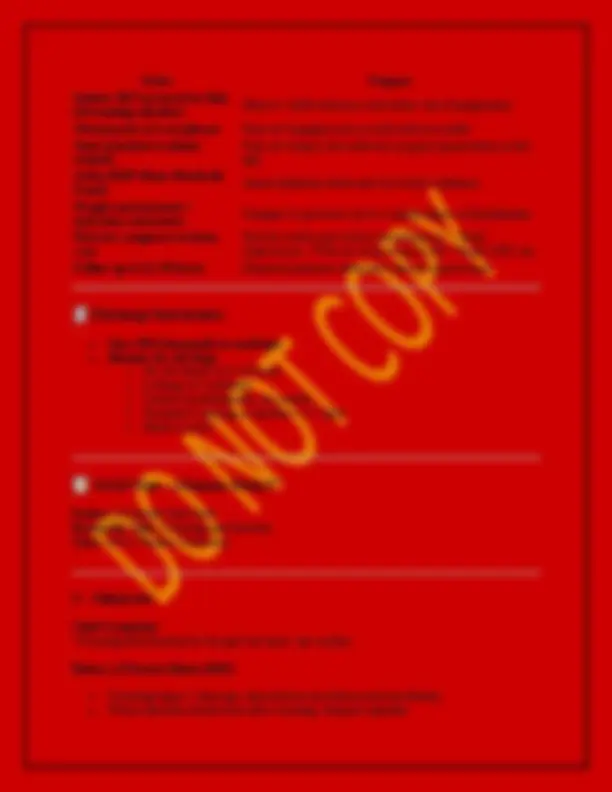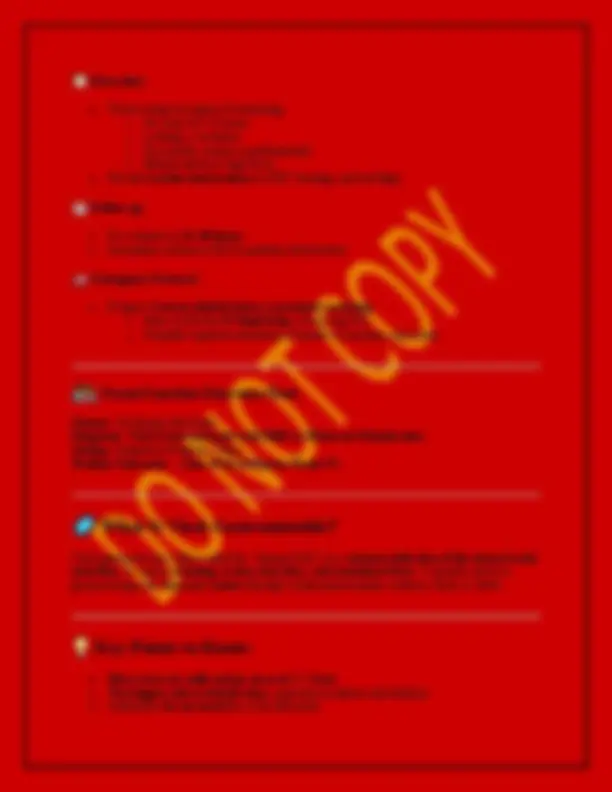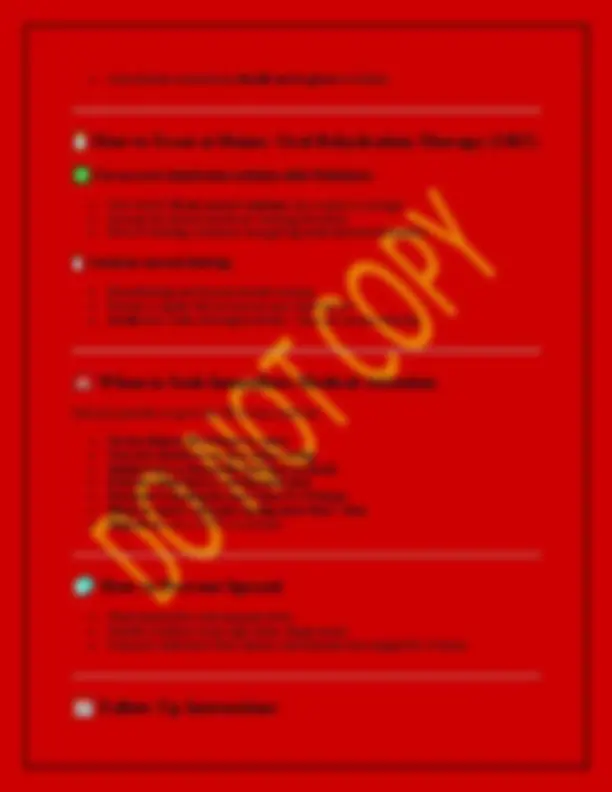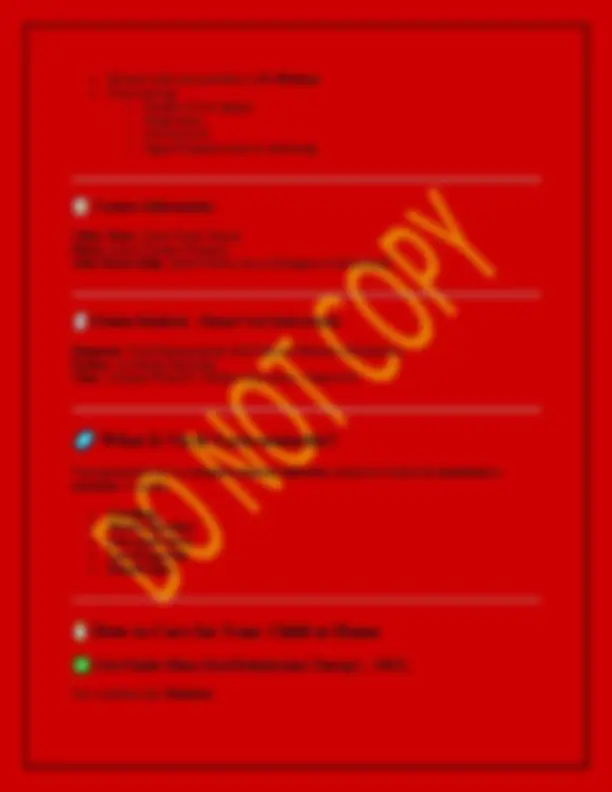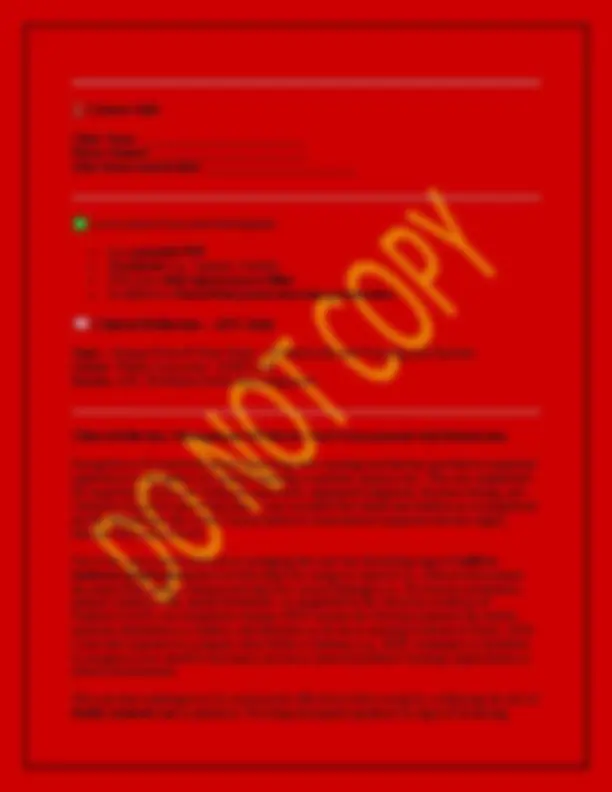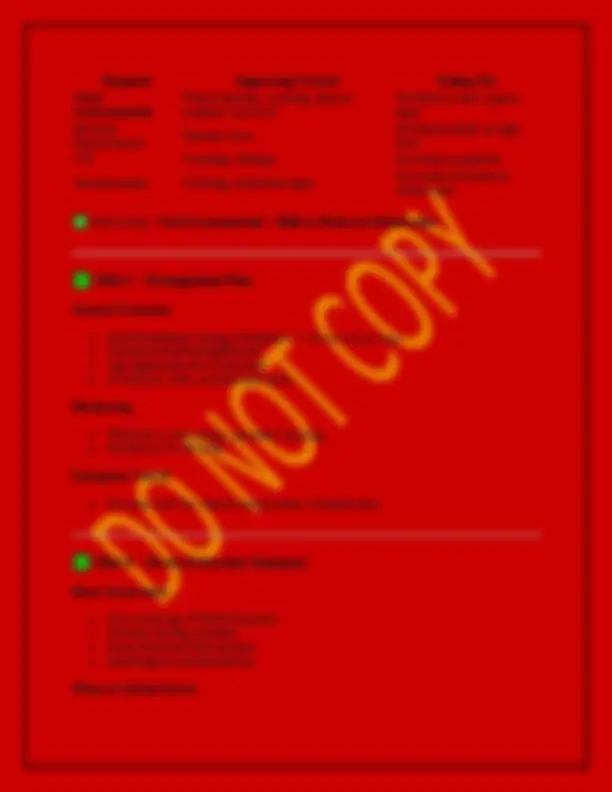Download I Human Case Week #7 An 18 Month Old Patient Reason For Encounter: Vomiting And Diarrhea ( and more Exams Integrated Case Studies in PDF only on Docsity!
I Human Case Week #7 An 18 Month Old Patient
Reason For Encounter: Vomiting And Diarrhea (6541)
Latest Case Study | Walden University.
Doctor–Parent Interview: 25 Q&A
Question Parent's Response
- When did the vomiting and diarrhea start? Two days ago.
- How many times a day is your child vomiting? About 4 to 5 times a day.
- When does the vomiting usually happen? Mostly after eating or drinking.
- What does the vomit look like? It’s clear to yellow, sometimes with bits of food.
- Have you seen any blood or bile in the vomit? No, no blood or bile.
- How many episodes of diarrhea has your child had daily? Around 5 to 6 watery stools per day.
- What color is the stool? Yellow-brown.
- Any blood or mucus in the stool? No, none.
- Is your child having wet diapers? Only a couple in the last 12 hours.
- How much fluid is your child drinking? Just a few sips of water, not much else.
- Is your child eating solid foods? No, refusing most foods.
- Is your child breastfeeding or taking formula? No longer breastfeeding, only eats solids and drinks water.
- Has your child had a fever? Yes, mild fever—around 100.9°F.
- Is your child more tired than usual? Yes, she’s been very tired and not playful.
- Is she still responding to you when you talk or play? Yes, but not as much as usual.
- Any recent changes in her weight? She seems a bit lighter, maybe from not eating.
- Is she having tears when she cries? No, not really.
- Has she been around other sick children recently? Yes, several kids in daycare have been sick.
- Does she go to daycare regularly? Yes, five days a week.
- Any new foods introduced recently? No, nothing new.
- Any signs of pain or discomfort in the tummy? She seems a bit uncomfortable, but no crying fits.
- Any rashes, ear tugging, or cough? No, none of those.
- Has she had this kind of illness before? No, this is the first time.
- Are all vaccinations up to date? Yes, fully vaccinated including rotavirus.
- Is there a history of allergies or medical issues? No, she’s been healthy until now.
Full HPI (History of Present Illness) – Bullet Format
Patient : 18-month-old child Reason for Visit : Vomiting and diarrhea
- Child began vomiting approximately 2 days ago
- Vomiting is described as non-bilious, non-bloody , occurring multiple times per day
- Watery diarrhea started shortly after vomiting began
- Diarrhea is frequent , loose, and without visible blood or mucus
- Parent reports a reduction in appetite and oral intake over the past 24 hours
- Fewer wet diapers than usual – only 2 in the last 12 hours
- Child appears more sleepy and less playful than usual
- Low-grade fever noted at home (maximum 100.9°F)
- No associated respiratory symptoms (cough, runny nose, congestion)
- No signs of ear tugging or pain
- No known sick contacts at home, but attends daycare , where other children have had similar symptoms
- No recent travel, no new foods introduced
- No known allergies or chronic health problems
- Immunizations are up to date
- Parents are concerned about dehydration and worsening lethargy
Past Medical History (PMH) – 18 - Month-Old Patient
- Birth history : Full-term vaginal delivery, uncomplicated
- Neonatal history : Normal APGAR scores, no NICU stay
- Development : Age-appropriate growth and developmental milestones
- Medical conditions : No chronic illnesses or diagnosed conditions
- Medications : None currently; no history of long-term medication use
- Allergies : No known drug, food, or environmental allergies (NKDA)
- Immunization status : Up to date per CDC schedule (including Rotavirus series)
- Hospitalizations : None
- Injuries or trauma : None reported .
Review of Systems (ROS) and Physical Examination
Case : 18-Month-Old Child with Vomiting and Diarrhea Format : CHEF → C (Chief Complaint), H (History), E (Exam), F (Follow-Up)
o MMR (may not yet have received first dose if younger than 12–15 months at last visit) o Varicella (typically given at 12–15 months)
- Recent Vaccinations : None in past 30 days
Review of Systems (ROS)
(Completed through caregiver interview; systems not listed were reviewed and found to be negative) System Findings General Lethargy, decreased activity, reduced oral intake, fewer wet diapers Skin No rash; skin appears dry HEENT Dry lips and mucous membranes; no ear tugging, congestion, or rhinorrhea Eyes Sunken appearance; no discharge Cardiovascular No cyanosis or murmur reported; cap refill delayed Respiratory No cough, wheezing, or shortness of breath GI Vomiting and watery diarrhea x 2 days; no blood or mucus in stool GU Decreased urine output; no pain with urination Neurological Sleepy but arousable; no seizures or abnormal movements Musculoskeletal Normal movement noted earlier; decreased due to fatigue Psychosocial Cranky, fussy, and more clingy than usual
Physical Examination
General Appearance :
- Lethargic but arousable
- Appears fatigued, irritable
- Less responsive to environment than usual Vital Signs :
- Temp : 100.9°F
- HR : 142 bpm (↑ for age)
- RR : 28/min
- BP : Not routinely measured in this age
- Weight : Slight decrease compared to last well-child visit
HEENT :
- Head: Normocephalic
- Eyes: Sunken, no scleral icterus or discharge
- Ears: No erythema or effusion (if visualized)
- Nose: Clear, no discharge
- Throat: Mucosa dry, no erythema or lesions
- Fontanelle: Anterior slightly sunken Neck :
- Supple, no lymphadenopathy Cardiovascular :
- Tachycardia
- Capillary refill ~3 seconds
- No murmur or gallop Respiratory :
- Clear breath sounds
- No retractions, grunting, or nasal flaring Abdomen :
- Soft, mildly tender to palpation
- No rebound, no guarding
- Active bowel sounds Skin :
- Dry
- Poor skin turgor
- Cool extremities Neurological :
- No focal deficits
- Arouses to voice/touch
- Less interactive than baseline
🫀 Pathophysiology of Congestive Heart Failure (CHF)
- Myocyte apoptosis & fibrosis → worsens contractile function
Summary of Clinical Effects
- Volume overload → edema, weight gain
- Pressure overload → ventricular hypertrophy
- Pulmonary congestion → dyspnea, orthopnea
- Neurohormonal dysregulation → RAAS, SNS, natriuretic peptide changes
Differential Diagnosis Table – 18 - Month-Old with Vomiting and Diarrhea
Setting : Outpatient Pediatric Visit | Case : i-Human Week #7 | Walden University – Class 6541 Differential Diagnosis Supporting Features Opposing Features Rationale Viral Gastroenteritis (Most likely)
- Acute onset of vomiting and watery diarrhea - Low-grade fever - Daycare exposure - No blood in stool - Dehydration signs
- None specific Very common in infants/toddlers, especially in group settings. Often self- limited. Most consistent with history and presentation. Bacterial Gastroenteritis (e.g., Salmonella, Shigella, E. coli)
- Diarrhea and vomiting - Fever possible - May have leukocytosis or positive stool culture
- No blood/mucus in stool - No severe abdominal pain or high fever - No recent travel or contaminated food Consider if symptoms worsen, fever spikes, or bloody stools develop. Currently less likely. Urinary Tract Infection (UTI)
- Vomiting, lethargy - ↓ wet diapers - Fever
- No dysuria or foul- smelling urine - No CVA tenderness UTI can present atypically in infants. Consider urinalysis to rule out. Otitis Media (AOM)
- Fever, irritability - Vomiting may occur in young children
- No ear tugging or URI symptoms - Normal ear exam (if done) Consider in fussy toddlers, but no otologic symptoms reported. Less likely. Intussusception
- Intermittent severe abdominal pain - Vomiting - Possible currant jelly stools
- No bloody stool - No abdominal mass or intermittent crying episodes A surgical emergency. Less likely without hallmark signs (currant jelly stool, colicky pain).
Differential Diagnosis Supporting Features Opposing Features Rationale Gastroesophageal Reflux Disease (GERD)
- Vomiting
- New acute onset - No chronic pattern - Associated diarrhea not typical GERD is chronic and would not present with diarrhea or fever. Unlikely. Food intolerance/allergy
- Vomiting, diarrhea after ingestion
- No new foods - No known allergies - No rash or respiratory signs Less likely with no food triggers identified. Most Likely Diagnosis : Viral Gastroenteritis with mild-to-moderate dehydration
Diagnostic Test Plan with Rationale
Case : 18-Month-Old Patient with Vomiting and Diarrhea i-Human Week #7 | Walden University – Class 6541 Diagnostic Test Purpose Rationale Basic Metabolic Panel (BMP) Assess electrolytes (Na⁺, K⁺, Cl⁻, HCO₃⁻), BUN, creatinine Detect dehydration and electrolyte imbalances (e.g., hyponatremia, hypokalemia) commonly caused by vomiting and diarrhea Urinalysis (clean catch or catheterized sample) Evaluate hydration status and rule out UTI Infants with vomiting may have a UTI with atypical symptoms. Also useful to confirm dehydration (e.g., concentrated urine) Stool for occult blood, leukocytes, and pathogens (if ≥3–5 days diarrhea) Rule out bacterial/parasitic causes Not indicated immediately unless diarrhea is prolonged, bloody, or associated with severe systemic symptoms Point-of-Care Blood Glucose Detect hypoglycemia Children with poor oral intake and vomiting are at risk for low blood sugar; rapid screening is essential Rapid viral panel (optional) Identify viral pathogen (e.g., rotavirus, norovirus) May be useful for epidemiology or infection control but not always necessary for outpatient management Weight measurement + comparison to baseline Monitor for weight loss due to dehydration A key indicator in pediatric dehydration assessment Capillary refill time and skin turgor (clinical tests) Assess hydration status While not lab tests, these are crucial bedside indicators of dehydration severity
- Rotavirus (especially if not fully vaccinated or post-vaccine strain)
- Norovirus (extremely contagious, daycare outbreaks common)
- Adenovirus or enterovirus (less common)
Important & Relevant Findings
i-Human Week #7 Case – 18 - Month-Old with Vomiting and Diarrhea Walden University – Class 6541
Key Clinical Findings
Category Finding Relevance Chief Complaint Vomiting and watery diarrhea for 2 days Primary symptom complex consistent with acute gastroenteritis Feeding/Intake Decreased appetite and oral fluid intake Risk factor for dehydration Urine Output Only 2 wet diapers in past 12 hours Strong indicator of moderate dehydration Activity Level Lethargic but arousable, less playful Early neurological sign of volume depletion Vital Signs Temp: 100.9°F HR: 142 bpm (tachycardia) RR: 28/min
- Fever supports infection - Tachycardia = compensation for hypovolemia Skin/Mucous Membranes Dry lips and oral mucosa Poor skin turgor Cool extremities Classic physical signs of dehydration Capillary Refill Delayed (~3 seconds) Reliable clinical marker of moderate dehydration Fontanelle/Eyes Slightly sunken fontanelle Sunken eyes Common dehydration indicators in infants/toddlers GI Symptoms Non-bloody, watery diarrhea Non-bilious vomiting Consistent with viral gastroenteritis Daycare Attendance Regular daycare exposure Increases risk of viral transmission (e.g., rotavirus, norovirus) Immunization Status Up to date, including rotavirus May reduce severity but doesn’t eliminate risk of viral GI infection
Summary of Most Relevant Findings
- Watery diarrhea + vomiting + daycare exposure strongly suggests viral etiology
- Lethargy, poor oral intake, ↓ urine output, delayed cap refill → point to moderate dehydration
- No blood in stool, no abdominal distention, and no focal pain → rules out surgical/emergent causes (e.g., intussusception)
Management Plan – 18 - Month-Old with Viral Gastroenteritis & Mild-to-
Moderate Dehydration
i-Human Week #7 | Walden University – Class 6541
I. General Management
Intervention Plan Oral Rehydration Therapy (ORT) Start immediately using Pedialyte or WHO-approved ORS solution: – Give 5 – 10 mL every 5 minutes via spoon or syringe – Increase volume gradually if tolerated – Continue even if vomiting persists Feeding Resume age-appropriate diet as soon as vomiting subsides: – Breastfeeding/formula should continue – No need for BRAT diet (can cause nutritional deficits) – Avoid sugary drinks, soda, juice, sports drinks Monitoring at Home Parents should track: – Number of wet diapers – Oral intake – Activity level – Signs of worsening dehydration (sunken eyes, poor perfusion)
II. Emergency Treatment (If Worsening or Severe
Dehydration)
Emergency Indications Immediate Actions No urine in 8 – 12 hours Persistent vomiting (unable to tolerate ORS) Lethargy or altered consciousness Sunken fontanelle, dry skin, no tears → Refer to ED for IV fluids : - IV normal saline (NS) bolus 20 mL/kg over 20–30 min - Reassess hydration and electrolyte status - Consider inpatient admission if unable to tolerate oral intake or moderate/severe dehydration persists
III. Doctor’s Plan (Provider Orders)
- Reduced appetite and fluid intake
- Only 2 wet diapers in the past 12 hours
- Low-grade fever at home (max 100.9°F)
- Lethargic, less playful than usual
- No blood in stool, no respiratory symptoms, no new foods
- No known sick contacts at home, but attends daycare (exposure risk)
- No past history of similar illness Past Medical History :
- Full-term vaginal delivery, no complications
- No hospitalizations or surgeries
- Immunizations up to date
- Normal growth and development Medications : None Allergies : No known drug or food allergies Family History : Non-contributory Social History :
- Lives with both parents and older sibling
- Attends daycare 5 days/week
- No smoke exposure
O – Objective
Vital Signs :
- Temp: 100.9°F
- HR: 142 bpm
- RR: 28/min
- BP: Not obtained (age-appropriate)
- Weight: Slightly decreased from previous well-child visit Physical Examination :
- General : Lethargic but arousable, fussy
- HEENT : Dry mucous membranes, sunken eyes, slightly sunken anterior fontanelle
- Skin : Poor skin turgor, dry, cool extremities
- CVS : Tachycardia, capillary refill ~3 seconds
- Respiratory : Clear breath sounds, no distress
- GI : Soft, mild generalized tenderness, active bowel sounds
- Neuro : No focal deficits, less interactive than baseline
Diagnostics Ordered/Performed :
- Point-of-care glucose – normal
- Urinalysis (catheter sample) – pending
- Weight loss assessment
- BMP – pending for dehydration/electrolyte analysis
A – Assessment
Primary Diagnosis : Viral Gastroenteritis with Mild-to-Moderate Dehydration ICD-10 Code : A08.4 (Viral intestinal infection, unspecified) Justification :
- Classic viral gastroenteritis presentation (watery diarrhea, vomiting, daycare exposure)
- Signs of dehydration (dry mucosa, ↓ wet diapers, sunken eyes/fontanelle, delayed cap refill)
- No signs of bacterial, surgical, or urinary infection at this time Differential Diagnoses Considered :
- Bacterial gastroenteritis – no blood/mucus, no high fever
- UTI – ruled out with urinalysis
- Otitis media – no ear pain, normal exam
- Intussusception – no severe pain or bloody stools
P – Plan
General Management:
- Initiate oral rehydration therapy (ORT) with Pedialyte: 5–10 mL every 5 minutes, increase as tolerated
- Continue breastfeeding/formula and resume normal feeding ASAP
- Avoid juice, soda, BRAT diet Diagnostics:
- Continue monitoring urinalysis and BMP results
- Monitor weight and hydration status over next 24–48 hours
- Anti-diarrhea medications should not be given to children
How to Treat at Home: Oral Rehydration Therapy (ORT)
Use an oral rehydration solution (like Pedialyte):
- Start with 5 – 10 mL every 5 minutes (use a spoon or syringe)
- Increase the amount slowly as vomiting decreases
- Even if vomiting continues, keep giving small amounts frequently
Continue normal feeding:
- Breastfeeding and formula should continue
- Resume a regular diet as soon as your child can eat
- Avoid juice, soda, and sugary drinks – these can worsen diarrhea
When to Seek Immediate Medical Attention
Call your provider or go to the ER if your child has:
- No wet diapers for 8 hours or more
- Very dry mouth or no tears when crying
- Sunken eyes or fontanelle (soft spot on head)
- Extreme sleepiness or unresponsiveness
- Persistent vomiting for more than 12–24 hours
- Blood in stool or diarrhea lasting more than 7 days
- High fever (over 102°F) or seizures
How to Prevent Spread
- Wash hands often with soap and water
- Disinfect surfaces (toys, high chairs, diaper areas)
- Keep sick child home from daycare until diarrhea has stopped for 24 hours
Follow-Up Instructions
- Recheck with your provider in 24 – 48 hours
- Keep tracking: o Number of wet diapers o Fluids taken o Activity level o Signs of improvement or worsening
Contact Information
Clinic Name : [Insert Clinic Name] Phone : [Insert Contact Number] After-Hours Help : [Insert Nurse Line or Emergency Instructions]
Patient Handout – Home Care Instructions
Diagnosis : Viral Gastroenteritis with Mild-to-Moderate Dehydration Patient : 18-Month-Old Child Class : i-Human Week #7 | Walden University – Class 6541
What Is Viral Gastroenteritis?
Viral gastroenteritis is a common stomach infection caused by viruses like norovirus or rotavirus. It causes:
- Vomiting
- Watery diarrhea
- Low-grade fever
- Loss of appetite
- Dehydration
How to Care for Your Child at Home
Give Fluids Often (Oral Rehydration Therapy – ORT)
Use a solution like Pedialyte :

